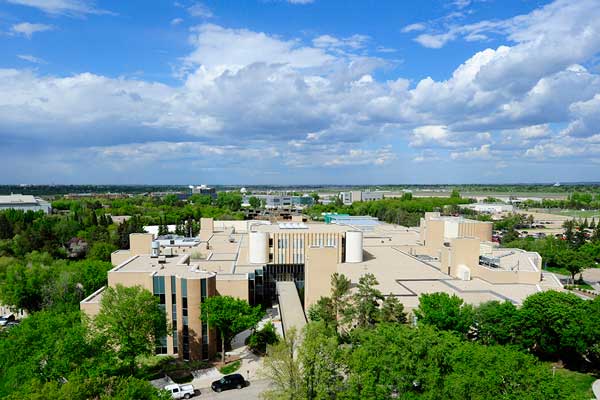

The Western College of Veterinary Medicine (WCVM) serves as the premier centre of veterinary education, research and clinical expertise for all of Western Canada.
The following website is applicable to western Canadians and individuals from the Canadian territories who meet the WCVM residency guidelines.
Through the Interprovincial Agreement (IPA), the western Canadian provinces (B.C., Saskatchewan and Manitoba) provide funding for a minimum of 88 first-year seats.
Veterinary medicine focuses on animal health and the study of diseases that affect all animal species. Veterinarians receive comprehensive training in all basic and clinical sciences with relation to a variety of species, including food‑producing animals, horses, companion animals, exotic pets and wildlife.
Quick facts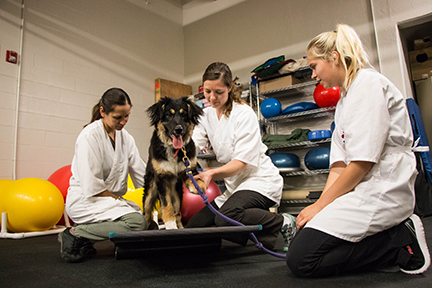
This program prepares you to meet the needs of animal health care in Western Canada and beyond. Our curriculum allows you to pursue personal interest areas including small, large or exotic animal care, surgery, medical imaging, anesthesiology, pathology, wildlife medicine, or animal-human health-related issues — just to name a few.
The veterinary curriculum is very diverse. You will learn about how the healthy body works, how it is disrupted and how to diagnose and treat various ailments. You will also learn about how animals are managed and how to keep them healthy.
You will gain hands-on experience with animals through formal laboratory exercises, elective courses and fourth-year rotations. You will also receive instruction in leadership, communication and practice management to prepare you for your future professional careers.
First two years
You will focus on basic and applied science core courses. You will learn about the functions of a healthy body and how they can be disrupted. Our new curriculum has an increased focus on clinical skills and ensuring that students have met vital competencies required to be a practising veterinarian.
Third year
You will gain more in‑depth, focused learning including hands-on experience in particular areas of interest through a range of core/elective courses.
Fourth year
You will gain clinical experience during the program's final year, completing a series of two- or four-week clinical rotations. Students can also arrange for externships at specialty practices, zoos and aquariums in other provinces or countries.
The Course and Program Catalogue has the complete and official listing of required classes and their descriptions for this program.
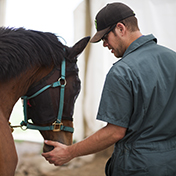
The college's Veterinary Medical Centre is Western Canada's centre for primary and specialized clinical services, as well as for veterinary teaching and animal health research.
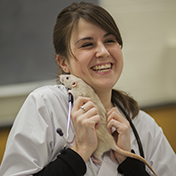
The WCVM Veterinary Medical Centre's diverse caseload ensures that veterinary students are exposed to a range of animal species and health issues during their senior years.
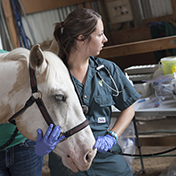
One of the finest introductory research initiatives in North America, first- and second-year students have the opportunity to work alongside experienced researchers at the college, learning more about the world of research and gaining valuable, hands-on experience.
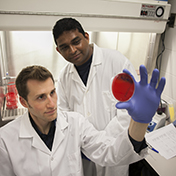
Veterinarians make ideal leaders of One Health, a global initiative for improving animal, human and environmental health through collaboration among all of the health sciences. That is especially true at uSask — the only Canadian university with a full complement of health science colleges and schools on one campus.
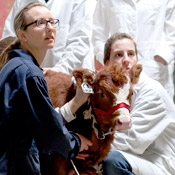
Veterinarians play a critical role in agriculture and production animal health, and the WCVM is well placed to educate new veterinarians in food animal medicine. uSask's College of Agriculture and Bioresources and the WCVM also collaborate on many food animal research studies that contribute to the students' training.
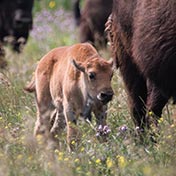
The LFCE includes a 1,500-head beef cattle feedlot, a forage cow-calf facility, a livestock research unit, facilities for specialized livestock, and a production cow herd with over 400 breeding animals.
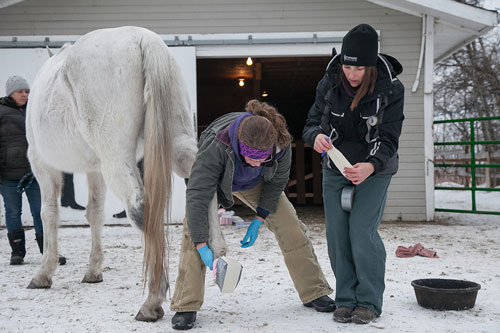
Private practice
Mixed animal practitioners treat large and small animals while large animal practitioners focus on agricultural livestock. Small animal veterinarians provide health care for dogs, cats and exotic pets. Some private practitioners specialize in treating individual species such as dairy and beef cattle, swine, horses or companion animals.
Specialized disciplines
Clinicians with advanced training provide specialized services in many clinical disciplines including surgery, internal medicine, medical imaging, anesthesiology, ophthalmology, veterinary pathology, dentistry, wildlife medicine and oncology.
Public service
Provincial and federal veterinarians help to develop public policy and legislation related to animal and animal human health. They regulate the import and export of livestock and food products. They are responsible for the control of infectious diseases among livestock and wildlife from a local to global level. They provide diagnostic services and ensure the health and safety of commercial meat products.
Academia and research
Veterinarians are involved in teaching and studying animal health at veterinary colleges, universities and research institutions. Veterinarians also contribute to advances in human medicine and collaborate with researchers around the world.
Industry
Veterinarians take part in the research and commercial development of new feed products, drugs and technologies with animal health companies.
The WCVM holds the status of full accreditation with the American Veterinary Medical Association (AVMA) Council on Education, allowing the WCVM to operate as a qualified centre for veterinary education and research.
WCVM graduates are eligible to practise in all provinces of Canada, in all American states and in most other countries around the world.
WCVM students write the North American Veterinary Licensing Examination (NAVLE) in the final year of the DVM program. The NAVLE is a comprehensive test that allows veterinarians to practise throughout North America. It is also accepted as a veterinary qualification in most other countries.
The WCVM's Veterinary Medical Centre is also an accredited members of the American Animal Hospitals Association (AAHA).
The college is recognized by the Royal College of Veterinary Surgeons (RCVS). This means WCVM graduates are eligible for membership in the RCVS, allowing them to practise in the United Kingdom and any country recognizing RCVS membership.
For further information about the WCVM’s accreditation, visit the WCVM website.
| IPA tuition | $14,720 |
|---|---|
| Student fees | $1,121 |
| Total | $15,841 |
Tuition estimates reflect a typical amount you could expect to pay per year (2024-2025 Canadian dollar rates).
Student fees are used to fund specific student benefits, including health, vision and dental coverage, a bus pass, recreational programs and fitness centre access.
*Non-IPA seats offered in fall 2020, fall 2021 and fall 2022
| Tuition | $14,720 |
|---|---|
| Non-IPA seat rate* | $55,000 |
| Student fees | $1,121 |
| Total | $70,841 |
Tuition estimates reflect a typical amount you could expect to pay per year (2024-2025 Canadian dollar rates).
Student fees are used to fund specific student benefits, including health, vision and dental coverage, a bus pass, recreational programs and fitness centre access.
*Non-IPA seat: Non-Interprovincial Agreement seat. These student seats are not provincially subsidized by the WCVM's partner provinces and are subject to potential annual increases.
| Additional fees or expenses | Year 1 | Year 2 | Year 3 | Year 4 |
|---|---|---|---|---|
| WCVSA fees | $25 | $25 | $25 | $25 |
| Board examinations (NAVLE) | n/a | n/a | n/a | $1,000 |
| Sask. Veterinary Medical Association fees | $200 | $100 | $100 | $100 |
| TLD dosimeters | $0 | $0 | $0 | $30 |
| Laptop computer | $1,000 | $0 | $0 | $0 |
| Textbooks | $1,500 | $2,000 | $1,500 | $1,000 |
| Printing and paper | $300 | $300 | $300 | $300 |
| Instruments and special clothing | $300 | $300 | $300 | $300 |
| Rabies immunizations | $150 | $0 | $230 | $0 |
| Travel expenses (optional) | $1,800 | $1,800 | $1,800 | $3,000 |
| Total (Canadian dollars) | $5,275 | $4,525 | $4,255 | $5,755 |
Prices subject to change and will vary from student to student and year to year. Living expenses are estimated to be between $15,000 and $20,000 per academic year, depending on personal living/accommodation preferences.
High school requirements
There are no specific high school requirements for the DVM program. However, the following high school courses are often required for university-level pre-veterinary courses:
University requirements
General counselling may be received by contacting the WCVM Admissions Office. Prospective applicants may contact the pre-veterinary advisor at their respective university for advising within their local context.
Students have organized pre-veterinary clubs at a number of universities across Western Canada. If you're interested in learning more about the Doctor of Veterinary Medicine (DVM) program and enjoy meeting other students who have similar interests, these student-run organizations offer a range of opportunities including tours, wet labs, guest speakers and resource materials.
The WCVM Veterinary Medical Centre offers volunteer opportunities to students interested in the Doctor of Veterinary Medicine degree program at the WCVM.
In fall 2023, the Western College of Veterinary Medicine (WCVM) will host a series of admissions information sessions for western Canadian residents who are applying to the WCVM's Doctor of Veterinary Medicine program (fall 2024 entry).
Please see the information and links below.
| Thursday, Oct. 26 6:30 p.m. CST (SK | General Admissions Click here to view video | WCVM Admissions Office |
| Thursday, Nov. 2 6 p.m. PDT (BC) 7 p.m. CST (SK) | B.C./Northern Territories panel Click here to view video | WCVM students and alumni from B.C. and the northern territories |
| Monday, Nov. 6 6 p.m. CST (SK) | Saskatchewan panel Click here to view video | WCVM students and alumni from Saskatchewan |
| Tuesday, Nov. 7 6 p.m. CST (MB/SK) | Manitoba panel Click here to view video | WCVM students and alumni from Manitoba |
As a regional veterinary college, the WCVM accepts applicants who are residents of British Columbia, Saskatchewan, Manitoba and the northern territories. The number of applicants admitted each year is determined by an allotment system:
*British Columbia, Saskatchewan and Manitoba each designate one seat for applicants of Indigenous membership/citizenship (more details below) as well as agriculture-focused seats. See Appendices A, B and C in the WCVM Applicant Manual for more details.
All applicants must be Canadian citizens or permanent residents of Canada. Residents of foreign countries are not eligible to apply for admission to the WCVM.
Transfer/advanced standing: Th e WCVM does not accept transfer (advanced standing) students into the DVM program. All applicants must start in Year 1 of the program regardless of previous education or experience.
An interprovincial agreement between the WCVM and its partner provinces (British Columbia, Saskatchewan and Manitoba) specifies definite rules to determine an applicant's province of residence. Proof of residency is required for all applicants.
Please review the WCVM Applicant Manual for full residency rules.
Note: residency guidelines for fall 2026 entrants may change as the WCVM is currently negotiating a new Interprovincial Agreement (IPA) with its partner provinces.
The WCVM has five first-year seats designated for Indigenous applicants — one in each provincial pool (B.C., Saskatchewan and Manitoba) as well as two seats in an open pool (B.C., Saskatchewan, Manitoba and northern territories). Indigenous applicants who choose to apply and be considered for admission through the WCVM’s designated Indigenous seats must be First Nations, Inuit or Métis persons of Canada.
Verification of Indigenous Membership/Citizenship at USask is led and determined by the deybwewin | taapwaywin | tapewin: Indigenous Truth policy and Standing Committee in accordance with the processes developed to enact the policy.
Applicants with verified Indigenous Membership/Citizenship will be considered for admission in their provincial pool as well as the designated Indigenous seats.
The pre-veterinary requirements consist of 60 credits (20 one-term/three-credit courses) of university-level courses from an accredited university/college. One credit represents one lecture hour equivalent per week for one term (or approximately one semester hour of credit).
| Effective fall 2025 entry |
| 6 credits of biology (lab required) |
| 6 credits of chemistry (lab required) |
| 3 credits of English/Communications |
| 3 credits of Indigenous Studies* |
| 3 credits of statistics |
| 3 credits of organic chemistry |
| 3 credits of physics (lab required) |
| 3 credits of biochemistry |
| 3 credits of genetics |
| 3 credits of introductory microbiology |
| 24 credits (eight one-term, three-credit courses) of electives |
| 60 TOTAL CREDITS |
*Indigenous Studies prerequisite must be on historical context and effects of colonialism on Indigenous people. Click here to view the “Indigenous Studies Requirement” list.
Electives: There are no "preferred" electives. The choice of electives should be based upon the requirements of the program in which the student is enrolled or the student's general interests.
Pre-veterinary courses completed at USask are usually completed through the College of Arts and Sciences or the College of Agriculture and Bioresources.
Pre-veterinary courses not completed at USask may be taken at any accredited post-secondary institution (as recognized by USask). Non-residents of Saskatchewan will not improve their chances of admission by attending the USask for pre-veterinary coursework. Courses taken as part of vocational programs — such as animal health or veterinary technology programs — are not usually accepted to meet the college's pre-veterinary course requirements.
Course guidelines: Courses included in the overall and best full-year average calculations must be appropriate or aligned with an applicant’s year of university and program. For example, upper-year students should be taking predominantly third- and fourth-year courses as opposed to introductory-level courses. Please see Section II.B. of the WCVM Applicant Manual for full details.
Full course requirement: All applicants must have completed at least two full years of university courses. The definition of a "full year" for this purpose is a minimum of 24 credits (eight or more one-term/three-credit courses, excluding labs) completed within the regular September to April academic year. Please see Section II.B. of the WCVM Applicant Manual for full details.
All grades are converted to a common scale for comparative purposes and this converted average will be used.
Casper is an online situational judgement test that measures aspects of your social intelligence and professionalism like ethics, empathy, problem-solving and collaboration. Note: the Duet assessment offered through Acuity Insights is not required.
Casper is an open-response situational judgment test that takes around 90 to 110 minutes to complete online.
The last Casper test date that will be considered for this application cycle is January 21, 2025. Applicants must select the University of Saskatchewan, Western College of Veterinary Medicine for distribution before the February 15, 2025, deadline.
You will need to create an account and sign up for the CSP-10201 — Canadian Professional Health Sciences version of Casper. To account for identity verification and payment processing timelines, ensure that you register for your test at least three days before your preferred test date and time. Last-minute bookings are not recommended. Applicants requiring testing accommodations must submit a request at least four weeks before their scheduled Casper test date.
Please direct any inquiries on Acuity Insights Assessments to support@acuityinsights.app . Alternatively, you may use the chat bubble in the bottom right corner of your screen on the acuityinsights.app website.
Casper test results are only valid for the admissions cycle in which the test is taken. Applicants who have already taken Casper in previous years are required to retake it to be eligible for subsequent admission cycle(s).
Applicants are required to have both experience and good knowledge of animals and the veterinary profession to be successful in gaining admission. The diversity, quality, depth and breadth of animal and veterinary experiences are assessed in the interview.
The importance of animal and veterinary experience is to ensure applicants “know what they are getting into” and are making an informed career choice.
Veterinary experience
Experiences should be obtained under the supervision of a veterinarian in placements such as clinical practice, research laboratories, animal shelters, animal rehabilitation facilities, public health settings or another related industry where a veterinarian is employed. Veterinary experience provides applicants insight into the day-to-day life as a veterinarian and an understanding of the veterinary profession. The purpose of the experience is not to learn a basic core of veterinary or animal handling skills. For many, obtaining veterinary experience means spending quality time with a veterinarian — either as a volunteer or as a paid employee.
Animal experience
Significant animal experience is required because it's assumed that most veterinarians will be working with animals during their career. Experiences working with animals allows applicants to determine how well they enjoy working with animals. These experiences also help to give an indication of their aptitude and compassion. "Significant animal experience" goes beyond pet ownership. For example, it could include responsibility for the care and husbandry of livestock or a food animal unit, breeding/showing animals, experience at rehabilitation facilities or humane societies/shelters, working in a pet store, participating in equestrian activities, or any other animal-related hobby or experience where a veterinarian is not always present.
Applicants' experiences are often consistent with their career goals. However, it's important to understand the diversity of the veterinary profession since both the DVM curriculum and the veterinary licensing examination require proficiency in a broad range of areas for successful completion. For this reason, it is strongly advised that applicants gain experience working with a variety of species such as cows, horses, pigs, chickens, fish, exotics, wildlife, dogs and cats.
The WCVM admissions committee recognizes that applicants' career goals in the veterinary profession may change over the course of their education. During the admissions process, there are no "preferred" career choices. Applicants with an interest in one type of practice are not given preferential treatment over those with interests in other areas.
The amount of animal and veterinary experience will vary from one applicant to another because some individuals are more perceptive than others and some experiences might be more useful than others.
Some applicants will be able to obtain these insights after minimal exposure while other applicants may need more time and exposure.
Admission to the WCVM is highly competitive, and completion of the pre-veterinary requirements does not guarantee acceptance to the college's DVM program.
Selection is based upon assessment of a number of factors including:
Degrees or diplomas held are not factors in the selection process.
The weighting of selection factors is 60 per cent academic and 40 per cent non-academic. The weighting is used to establish the rank order of applicants who will be offered admission — with the exception of the agriculture-focused seats (see appendices A, B and C of the WCVM Applicant Manual).
Note: a minimum score in the Situational Judgment Test will be required (as determined by the WCVM Admission’s Committee) to be eligible for admission consideration.
Mental aptitude and academic performance are mainly evaluated by academic transcripts.
All university work undertaken is considered when evaluating academic performance. The courseload of the applicant is a consideration.
The academic score, as outlined below, is the basis for interview offers:
*The definition of a full year for this purpose is a minimum of 24 credits (eight or more one-term/three-credit courses excluding labs) completed within the regular September-April academic year.
The structured interview is designed to assess the applicant's understanding of the profession with the veterinary program and to evaluate non-academic qualities. Referees' evaluations and overall documentation are also used to assess these non-academic qualities.
Applicants will be permitted to have a maximum of three interviews. After an applicant has had three interviews, the WCVM will not consider any further applications.
Applicants are required to nominate two referees to support their WCVM application. One referee must be a veterinarian while the other must be an individual who has an animal-related or agricultural background. Space is provided on the application form to list referees name and email address.
Referees will be contacted directly and asked to complete the reference form online. View a sample reference form.
2 years: 7
3-4 years: 50
5+ years: 31
Admitted with BSc degree complete: 45
Admitted with MSc/professional degree complete: 1
The deadline to apply online for the Western College of Veterinary Medicine's Doctor of Veterinary Medicine program is December 1.
Before submitting your application, please review the essential skills and abilities (see below) required for the study of veterinary medicine.
While a disability should not preclude a student from consideration for admission, disabilities must not prevent the student from:
Applicants who are admitted to the DVM program will be required to attest that they are able to meet essential skills/technical standards with or without reasonable accommodation.
The Western College of Veterinary Medicine (WCVM) at the University of Saskatchewan is committed to collaborating with students to ensure accessibility and to ensure a respectful culture of accommodation. We encourage students to proactively seek accommodations.
After review of the essential skills for veterinary medical education, applicants and students who require reasonable accommodation to fully engage in the program should contact Access and Equity Services to privately discuss their accommodation needs. Timely requests are essential and encouraged, as, given the clinical nature of the program, time may be needed to create and implement the accommodation. Accommodations are never retroactive.
Essential skills for veterinary medical education
Applicants and students must demonstrate a number of essential skills and abilities. These are also called “technical standards” and refer to all non-academic criteria that are essential to participation in the program.
Observation
Students should be able to directly obtain information from demonstrations and procedures in pre-clinical and clinical coursework. Students should be able to assess a patient and evaluate findings accurately, detect changes in patient behaviour, physical and mental status to provide appropriate veterinary care. These skills require the use of vision, hearing and touch, or the functional equivalent.
Communication
Students should be able to communicate with clients and all members of the health care team, to establish effective professional relationships in order to elicit and provide information. Students should be able to communicate effectively and sensitively, both in person and in writing.
Motor
Students should, after a reasonable period of time, possess the capacity to directly perform physical examinations and preventive, diagnostic, medical, surgical and emergency procedures. Such actions require some co-ordination of both. gross and fine muscular movements, balance and equilibrium.
Intellectual, conceptual, integrative and quantitative abilities
Students should be able to comprehend, retain and apply detailed and complex information and engage in problem solving in pre-clinical and clinical coursework.
Students are expected to possess the ability to accurately measure, calculate, reason, analyze, synthesize and communicate information. In addition, after a reasonable amount of instruction, students should be able to comprehend spatial and three-dimensional relationships of structures, such as the anatomical structure of an animal. And students should also be able to adapt to different learning environments and modalities.
Behavioural and social abilities
Students should possess the emotional health required for full utilization of their intellectual abilities, the exercise of good judgment, the prompt completion of all responsibilities attendant to the diagnosis and care of patients, and the development of mature, sensitive, and effective relationships with clients, fellow students, faculty, staff, and the entire health care team. They should be able to fully attend the curriculum, which requires active engagement in educational and clinical activities. They should display flexibility and adaptability and function in a fast-paced, changing environment with the uncertainties and stressors inherent in the clinical problems of many of their patients.
Students must also be able to receive, comprehend and act on informal and formal constructive feedback. Compassion, integrity, concern for others, interpersonal skills, professionalism, interest, motivation, punctuality and consistent attendance are all personal qualities that are expected during the education process.
Ethics and professionalism
Students should maintain and display ethical and professional behaviours commensurate with the role of a veterinarian in all their interactions with clients, patients, faculty, staff, fellow students, the entire health care team and the public. After a reasonable period of time, students should also be able to demonstrate realistic self-assessment of knowledge and skills and engage in personal reflective practice to achieve the competencies of the program and of the profession. The student is expected to understand the legal and ethical aspects of the practice of veterinary medicine and function within the law and ethical standards of the profession.
The essential skills delineated above must be met with or without reasonable accommodation. This policy exists to ensure students who are entering the DVM program are aware of the requirements necessary for the study of veterinary medicine, and they have a reasonable opportunity to complete the program and earn a DVM degree.
After reviewing the essential skills, students who determine that they require reasonable accommodation to fully engage in the program should contact Access and Equity Services to discuss their accommodation needs privately.
Accommodation information, not diagnoses, is shared with appropriate administrative and teaching staff and faculty on a need-to-know basis related to the timely implementation of accommodation. Given the clinical nature of the program, time may be needed to create and implement the accommodation. Accommodations are never retroactive; therefore, timely requests are essential and encouraged.